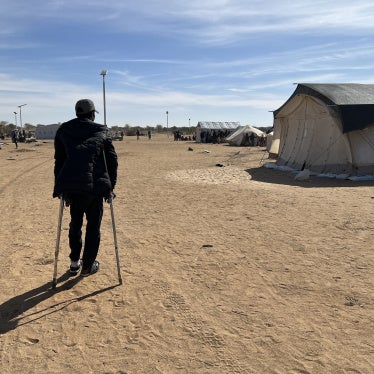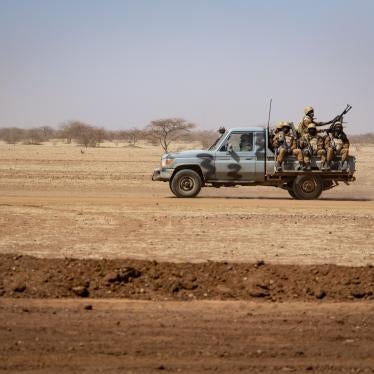In view of the Sudanese government’s latest failure to meet its commitments, including to the deployment of an African Union-United Nations force in Darfur, Human Rights Watch calls on the Security Council to apply targeted sanctions on individuals responsible for serious violations of international humanitarian law and a Darfur Recovery Fund.
In view of the Sudanese government’s latest failure to meet its commitments, including to the deployment of an African Union-United Nations force in Darfur, Human Rights Watch calls on the Security Council to take the following actions to compel the government to end its abusive policies in Darfur and accept without delay the full deployment of the proposed African Union-United Nations protection force.
1. Targeted Sanctions: The Security Council should impose, and call on all United Nations members to assist in implementing, targeted individual sanctions (travel bans and asset freezes) on senior government and militia leaders responsible for serious violations of international humanitarian law in Darfur as identified in two Panel of Experts reports. The Security Council should promptly act to impose such sanctions, authorized by Security Council Resolution 1591 of March 29, 2005.
2. Darfur Recovery Fund: In addition to imposing targeted individual sanctions, the Security Council should now establish, under Chapter VII of the UN Charter, a mandatory “Darfur Recovery Fund” into which all revenues from the export of Sudanese oil must be paid directly by the purchasers of that oil. Both the Sudanese government and private firms could continue to export oil—and Sudan’s existing customers could continue to buy it—but all proceeds from such exports and all royalties and similar payments owed to the Sudanese government would be required to be paid directly to the Fund, which would be administered by an independent UN-designated financial institution (such as the World Bank) that would serve as escrow agent.
The Darfur Recovery Fund would distribute such proceeds (1) to the government of South Sudan in accordance with the Comprehensive Peace Agreement of January 9, 2005; (2) to the oil exporting firms for oil production and delivery costs; (3) to the Sudanese government for those substantiated expenditures on social services that are currently paid for with oil export revenues; and (4) the balance to victim compensation and recovery projects in Sudan, with the goals of facilitating the safe and voluntary return of displaced persons, assistance in reconstructing homes and replanting fields and other humanitarian needs both in Darfur and elsewhere in Sudan. All Darfur Recovery Fund receipts and disbursements should be subject to regular independent audits, as should the assistance and recovery projects carried out with Fund assistance. Domestic oil sales (about 15 percent of Sudan’s production) would not be affected by or subject to the Fund.
In establishing the Darfur Recovery Fund, the Security Council should also specify the actions required by the government of Sudan to rescind the mandatory Fund procedure. These conditions should include: (1) consent by the Sudanese government to the full deployment of an effective African Union-United Nations protection force in Darfur with a mandate to take all necessary measures to protect civilians; (2) cessation of further financial or logistical support to the “Janjaweed” militias and cooperation with African Union and the United Nations on a genuine plan for their disarmament; (3) an immediate end to attacks on civilians by Sudanese armed forces and Janjaweed militias; (4) cooperation with the International Criminal Court in its investigations of crimes in Darfur and on any requests for extradition of Sudanese citizens; and (5) full and unimpeded access to and within Darfur for Sudanese and international humanitarian workers, human rights organizations, and media. At such time as the Security Council finds that these conditions have been met, the Darfur Recovery Fund would be terminated and any remaining proceeds distributed to qualifying recipients in accordance with the Fund’s procedures.
Neither the people of Darfur nor the international community can continue to tolerate the delays, backsliding, and outright defiance by the government of Sudan in carrying out the Security Council’s repeated demands for action to end human rights violations in Darfur. Both targeted sanctions and a mandatory Darfur Recovery Fund, as proposed above, should now be approved by the Security Council and all United Nations members urged to assist in their implementation.
Sincerely,
Peter Takirambudde Executive Director, Africa Division








